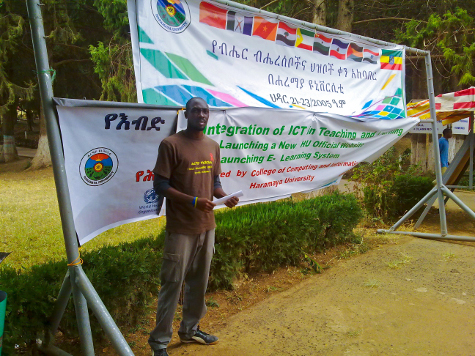Running Water, Running Internet
Story

When Gerald Luzangi saw students at Haramaya University crowded into the cafeteria trying to access their email accounts, check Facebook or search the Internet, he knew he had his work cut out for him.
Despite being one of the oldest and most prominent universities in Ethiopia, Luzangi was surprised to discover that the cafeteria was the only reliably accessible Wi-Fi spot on campus. “Internet for students should be available for anyone at anytime, anywhere,” he says.
After arriving in Ethiopia in late March 2012 for a year-long placement as a Cuso International volunteer working as an Information Technologies (I.T.) specialist, he set about to not only increase Wi-Fi access on campus, but establish an email server for all the students and faculty, re-design the university’s website, launch an E-learning system and migrate the network services platform from Windows-based servers to Unix.
Located about 40 kilometers from the city of Dire Dawa, far from the country’s capital, Luzangi’s job was challenging – and included ‘issues’ he didn’t have to deal with as a self-employed I.T. specialist in Toronto.
“Internet reliability was an issue. Sometimes the rebels would cut fibre optic cables and there wouldn’t be Internet on campus for two or three weeks.”
Formerly known as Alemaya University, the institute was established by Emperor Haile Selassie in 1954 to modernize Ethiopian agriculture. Today, the country’s economy remains largely agricultural-based. To help the university succeed in its mission, Cuso International and its strategic partner VSO has partnered with the university. In recent years, it underwent huge expansion in both its academics and facilities. Keeping up with the growth was difficult for the university’s I.T. department. That’s where Luzangi’s expertise helped.
A global citizen
Luzangi was working as an application developer and I.T. administrator when he saw the Cuso International job posting on ITjobs.ca. Despite never having heard of Cuso International, the ad for a Systems and Network Administration, Applications Developer at Haramaya University intrigued him. “If I stayed in Canada I wouldn’t be able to do these two things in the same capacity,” he says. “I often do the two jobs separately. It was very enticing for me.”
Born in Tanzania, Luzangi was comfortable with leaving home and experiencing new cultures. At age 19 he went to Japan to study computer programming, and in 2003 arrived in Canada to continue his computer studies at the University of Guelph and Ryerson University. As a native African, Luzangi, 34, thought working and adapting to life in Ethiopia would be easy. “My first thought was that East Africa is very similar to Tanzania,” he says.
“I was really wrong.”
One of the fastest-growing economies in the world and Africa’s second most populous country, Ethiopia underwent a series of famines in the 1980s, exacerbated by civil wars. The country has been recovering, but with an exploding population it remains one of the poorest nations in the world. (Ethiopia ranks 173 out of 187 countries on the UN Human Development Index.)
Living outside a major urban area with none of the luxuries he was accustomed to, and unable to speak the native language, proved challenging for Luzangi. Reliable running water was one of the luxuries he missed. At night, his routine became opening the taps after the water had stopped for the day and placing an empty bucket under them. If the welcoming sound of running water filling the bucket woke him in the morning, he knew he would be lucky enough to start the day with a shower.
Adapting to a different culture and pace of work took some adjustment and ingenuity. Luzangi quickly realized that he would have to be creative if he wanted to fit in and get work done. “In Cuso training they told us that you really can’t be judgemental,” he recalls. “The important thing is not to lose the friendships and to try to learn their ways.”
Kicking around solutions
An avid soccer player, Luzangi decided to use the game he loved as a way to not only integrate into the community, but develop a sense of camaraderie and trust amongst his colleagues. He took to carrying his soccer ball wherever he went. “I was really social in sports and that was very critical for me,” he says.
After hanging out with the university’s team, he persuaded some people in the I.T. office to play with him. Relationships developed and before long they were spending time together outside of work. In the evenings, they would often work on his laptop at home.
Learning Amharic, Ethiopia’s official language, was another key step toward Luzangi’s integration. After several months in Ethiopia he did a month-long language training session. Along with Swahili, Japanese and English, Amharic is now included on his impressive list of languages.
“People reacted differently to me and were very receptive,” he says of his return to the university after completing language training. “Speaking a local language is very powerful. It shows that you are very interested in the people and the culture and want to be part of it.”
Luzangi is proud of what he accomplished and appreciative of what he absorbed during his Cuso International placement. “I learned so much from being on the ground. One is that I shouldn’t follow the typical ways of doing things.”
Being immersed in a culture that places a deep importance on relationships, Luzangi says he also learned to “just be,” and to make time for people. “I really developed my interpersonal skills. Ethiopians value friendship so much. That really taught me a lot.”